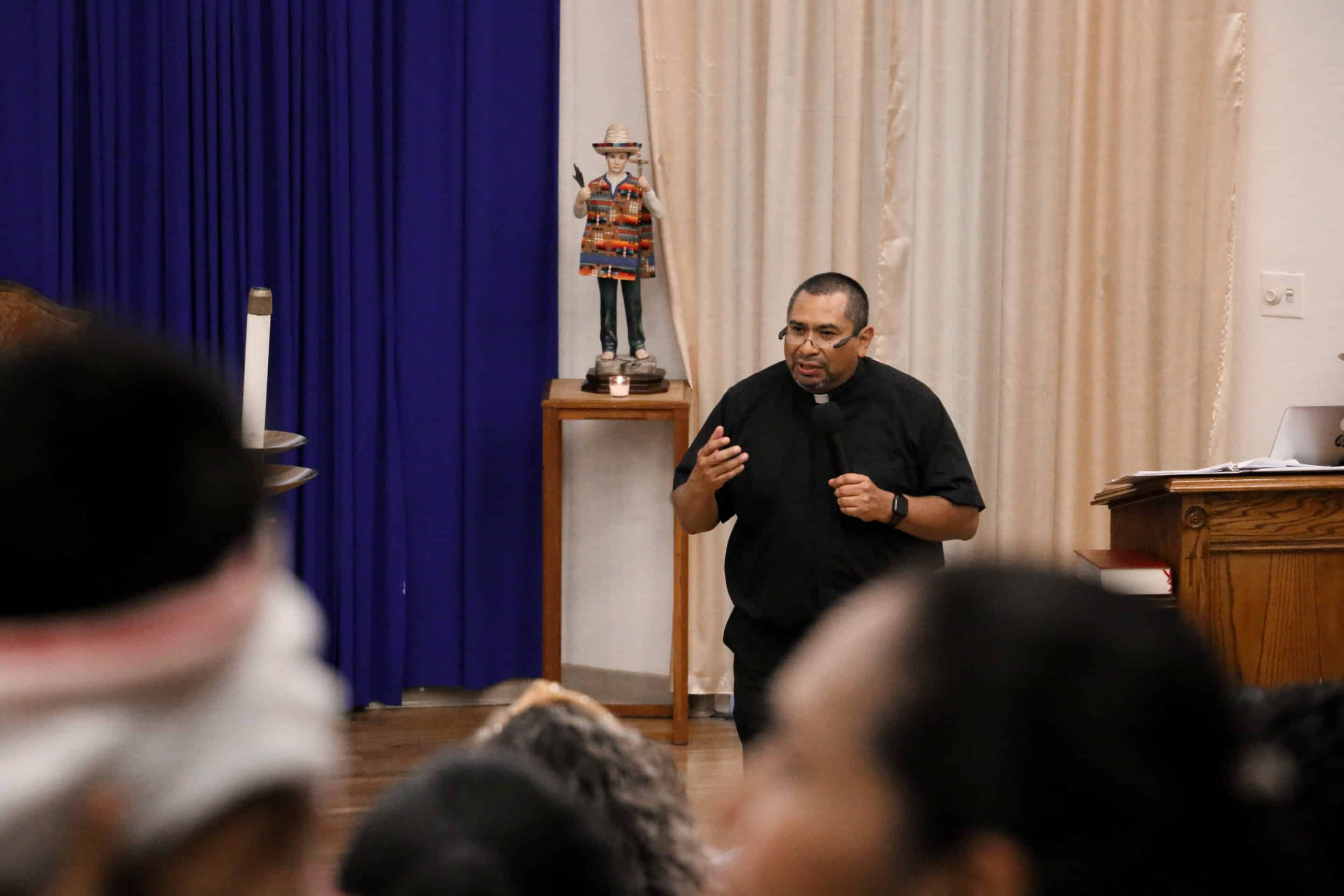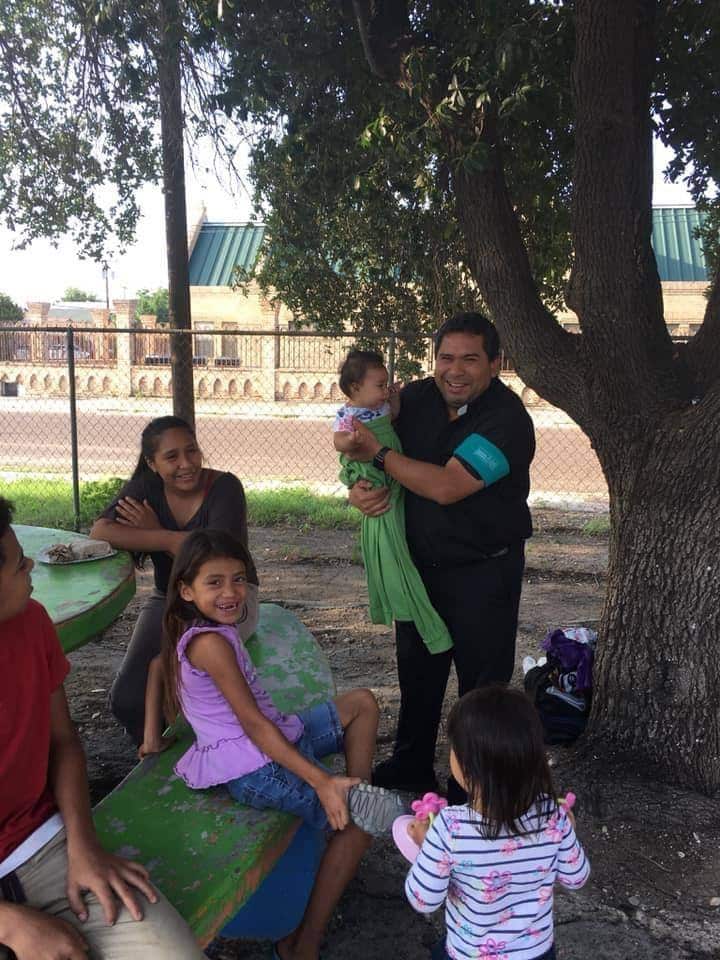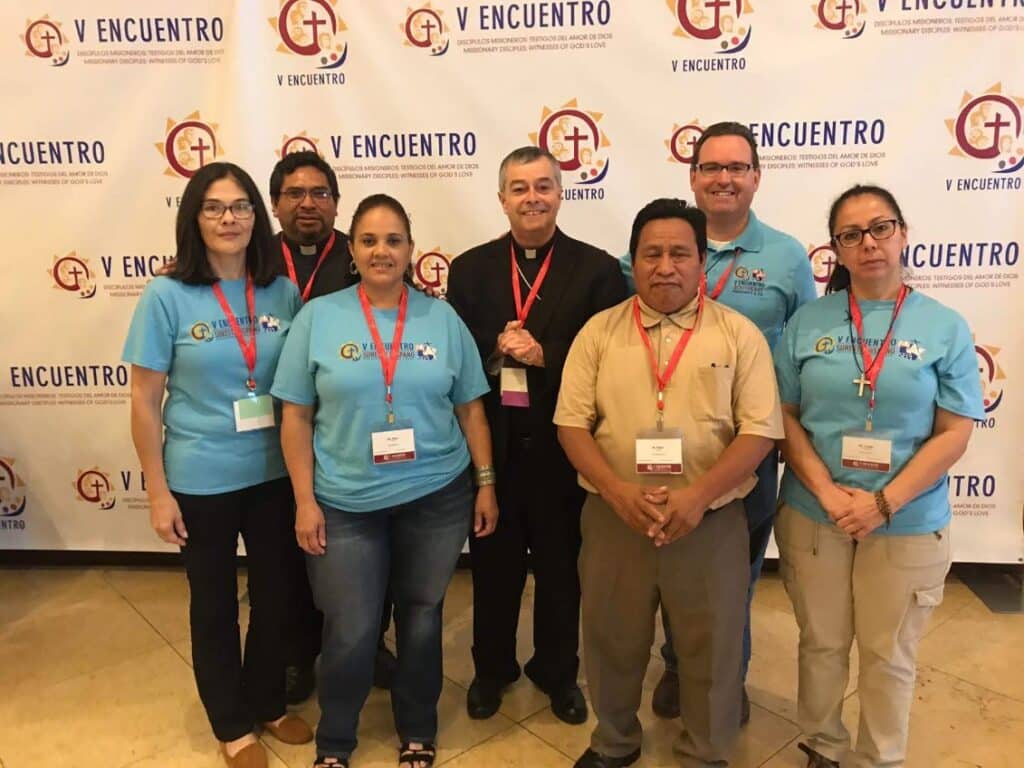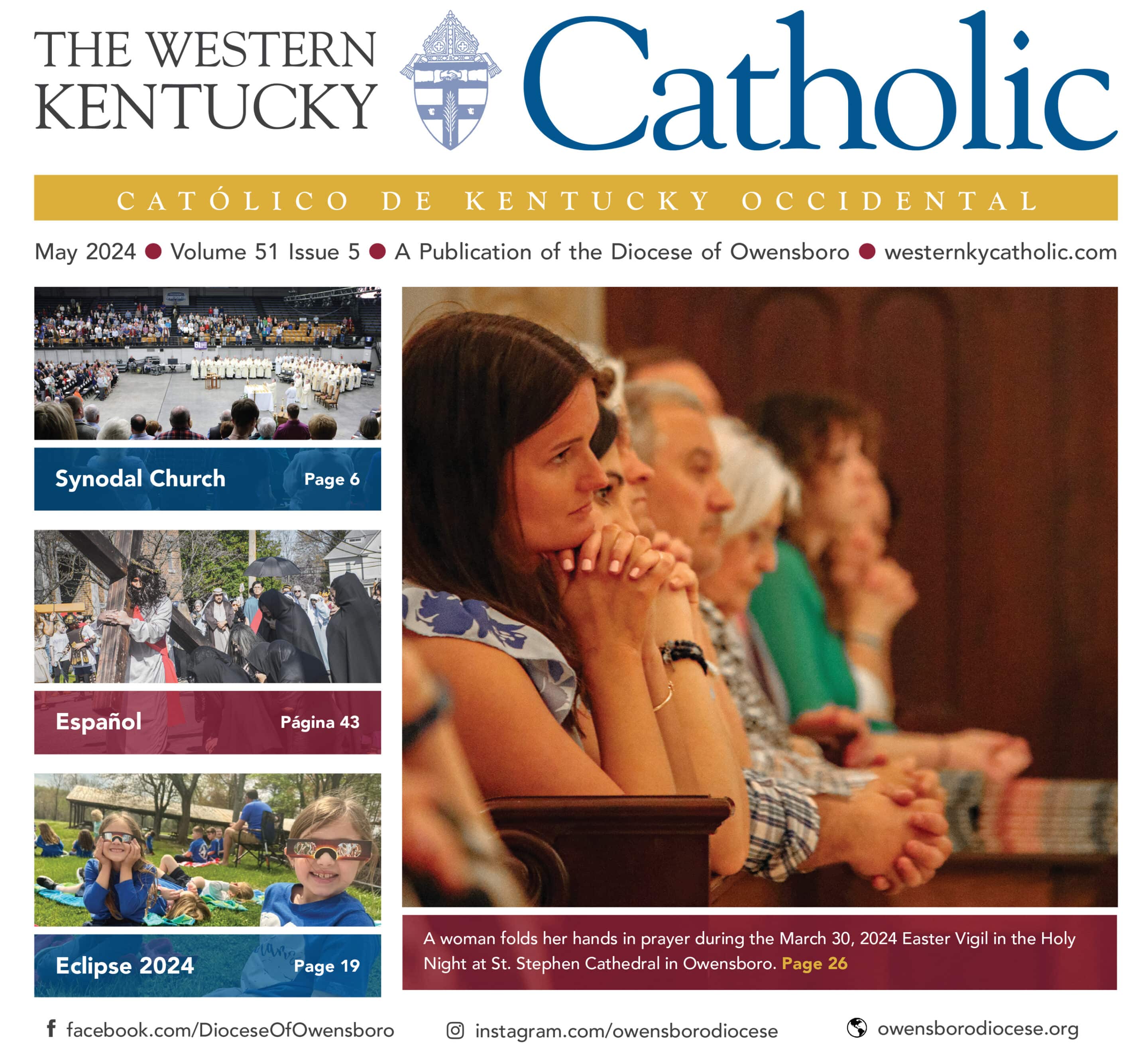
Fr. José Carmelo Jiménez speaks during a Hispanic Eucharistic Revival Day at Brescia University in Owensboro on Dec. 3, 2022. RILEY GREIF | WKC
‘God calls, and I will answer’
Sebree pastor reflects on 25 years of his vocation
BY ELIZABETH WONG BARNSTEAD, THE WESTERN KENTUCKY CATHOLIC
Fr. José Carmelo Jiménez, the pastor of St. Michael Parish in Sebree – and who this past April celebrated 25 years as a priest – can recall a specific incident in his early priesthood that shaped how he views his vocation.
While serving as a young priest within the Diocese of San Cristóbal de Las Casas in Chiapas, Mexico, Fr. Jiménez traveled to rural areas to administer the sacraments in 82 different communities, each of which had their own small chapel but no resident priest. (As a priest of the Archdiocese of Tuxtla Gutiérrez, they often provide ministry to the smaller nearby diocese.)
“It was a dangerous social, political and economic situation at that moment,” said Fr. Jiménez, adding that it was a difficult setting to be a priest.
He and the people he traveled with were ambushed and even shot at several times while journeying to the various chapels – some communities being far enough from the paved road that driving was impossible. Multiple government checkpoints scattered throughout the region also made the travels tense.
One day, while stopping at one of the checkpoints, a military captain said he wanted Fr. Jiménez to celebrate a wedding for himself and his girlfriend who was flying in that day. They lacked the proper paperwork for a valid Catholic marriage to take place, so Fr. Jiménez said no and walked on.
After a day in the community celebrating Mass, hearing confessions and administering baptisms, Fr. Jiménez passed back through the checkpoint – only to be stopped by soldiers who said he was going to the military base with them.
He tried to escape but was forcibly taken to the base, where the captain was waiting with a table with a crucifix on it. Once again, the captain demanded that the young priest celebrate the wedding.
“I said no,” said Fr. Jiménez. He was then beaten until he passed out – three different times. Each time he came to, he repeated his refusal to do the wedding, which would not be legitimate in God’s eyes.
Meanwhile, his bishop had received word of the situation and was calling different officials. Eventually a helicopter came to the base and rescued him, and he never had to celebrate the wedding.
“The way I am as a priest was formed and impacted by those early years,” he said.

Fr. José Carmelo Jiménez greets a family while volunteering with Catholic Charities on the border of Mexico and Laredo, Texas, in 2019. COURTESY OF FR. JOSÉ CARMELO JIMÉNEZ
Despite this tumultuous beginning, Fr. Jiménez felt the call to do mission work. After about two years of serving in Chiapas, he told his bishop that he would like to go to Africa to serve as a missionary priest.
Instead, his bishop asked him to serve in the United States.
Fr. Jiménez was skeptical: “They have everything. They need nothing,” he said.
But, in obedience to his bishop, he agreed to go and arrived in the Diocese of Owensboro on April 28, 2006. He quickly began ministering to the Latino population in western Kentucky, and learned that while their needs were different from that of his home diocese, they were just as significant.
Over the years, he has served the Latino population in areas like Hopkinsville, Elkton, Guthrie, Russellville, Bowling Green, Owensboro, Henderson and today, Sebree and Madisonville. He has witnessed people travel from far away to attend Mass in the familiar Spanish language, and has himself traveled around to celebrate Mass in people’s homes when a Catholic church is not nearby.
As Latino communities grow across western Kentucky, Fr. Jiménez’s bishop in Chiapas has continued the agreement with previous Bishop John J. McRaith and now Bishop William F. Medley that Fr. Jiménez remains and ministers to the people of the Bluegrass State.
To date, Fr. Jiménez has spent nearly 18 years in the Diocese of Owensboro out of his 25 total years of priesthood.
He appreciates his parishioners in Sebree, who, whether white, Guatemalan, Mexican, Honduran, Nicaraguan, or another heritage, refer to themselves as one community.
“There is something beautiful in the community,” he said, explaining that “English speakers, Spanish speakers, say ‘We are one community, different languages.’”
He enjoys the bilingual Triduum liturgies with his parishioners, who respond to the reading of the Passion in their own languages: “To have the community respond like that – I love that,” because “they feel it’s their home.”
Fr. Jiménez has helped people find medical care when a language barrier or lack of documentation makes it difficult, he has comforted parishioners when a parent in their home country dies and they are unable to go to the funeral, and “we help a lot with immigration,” he said. “I cry with the people because they suffer a lot.”
“I’m not an immigration lawyer, but I have learned a lot,” he said. “I rejoice with the people who after 20 or 25 years get their papers.”

Fr. José Carmelo Jiménez, along with Bishop William F. Medley and representatives from the Diocese of Owensboro, attend the V Encuentro gathering in Texas in 2017. COURTESY OF DCN. CHRIS GUTIÉRREZ
He has also seen the flourishing of the community of Guatemalan parishioners who speak Acateco, an indigenous Mayan language. To date, about 60% of his parishioners speak Acateco.
Since there is no official Mass translation in Acateco, Fr. Jiménez celebrates a liturgy in Spanish with portions in Acateco, such as the Gospel, the Our Father, and the homily, which is given by Acateco-speaking Dcn. Baltazar Rafael.
This Mass is livestreamed and followed by many Acateco-speaking Catholics across the country. To Fr. Jiménez’s knowledge, his church is the only one in the United States to utilize the Acateco language.
Sometimes Fr. Jiménez reflects on his original dream of being a missionary priest in Africa, but “I love the Owensboro diocese, and serving here.”
His continued obedience to “wherever God calls me to go” is inspired by a conversation with his mother shortly after he became a priest.
His mother had been diagnosed with a brain tumor the February before he was ordained. After his ordination, Fr. Jiménez would use his day off to visit her at home. But each time he visited, his mother would tell him about a friend or neighbor in need of a blessing or other spiritual assistance.
Fr. Jiménez protested this, telling his mother that he was there just to see her. Then, his mother told him a story about the day he was ordained.
“That day I said to the bishop, ‘God gave me a son, and I raised him until now; now I give him to the Church,’” his mother told him.
Fr. Jiménez understood, and has carried those words in his heart to this day.
“I want to continually serve with love and dedicate my life to the people and to God,” he said. “My whole priesthood, every day is different. God calls me, and I will answer, ‘I am here.’”
Years ago, he said, he had a lot of goals.
“But those were ‘my’ goals,” he said. “Now, wherever God takes me, I will go.”
Originally printed in the May 2024 issue of The Western Kentucky Catholic.

